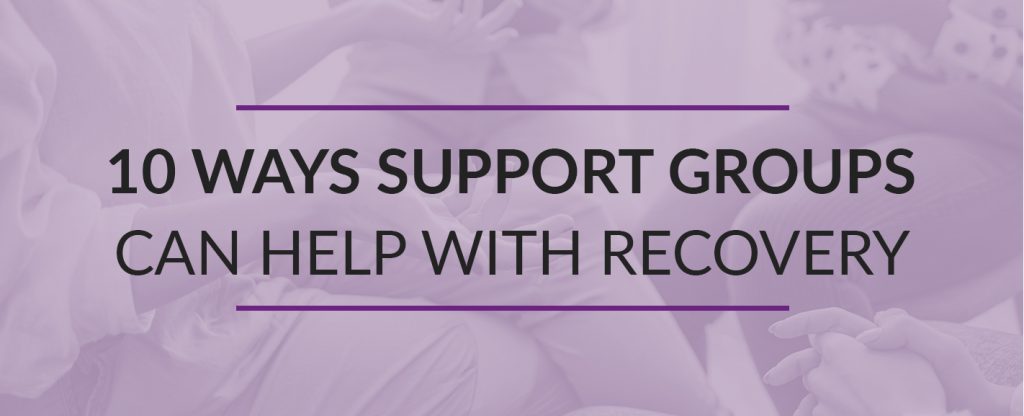

Content medically reviewed by Vicky Magobet, PMHNP-BC, on April 24, 2020.
Addiction commonly leads to isolation and a lifestyle that pushes others away in favor of substance abuse. It isn't easy to let other people into your life again even once you've begun recovery, but social interaction is a crucial component of success in staying sober. Recovery support groups in rehab and throughout the early days of sobriety can be a vital source of encouragement, so we're giving you 10 reasons to think about the importance of support groups in recovery.
Chronically abusing drugs and alcohol can drive away your friends and family in a short period. As a result, many people begin recovery feeling desolate and isolated. Support groups in rehab are a chance to disprove this unhelpful belief. Once you complete those first few sessions, you will have heard the stories of people with similar experiences and realize that you can find support from those who understand what you're going through.
Your options extend beyond in-person meetings. SMART Recovery, for example, offers online meetings and forums where you can find others who are invested in recovery and looking for mutual support. That way, even people who don't have the time or inclination to attend multiple meetings a week can actively participate in a recovery community.
Support groups not only offer the chance to connect with people who have walked a similar path, but they also allow you to benefit from the knowledge of people who are far ahead of you on their recovery journeys. Hearing their struggles and successes will play a critical role in developing a vision of your goals and avoiding pitfalls along the way.
Most support groups include members at all different stages of recovery, making it natural for those with more experience to mentor or sponsor newer members. This loose structure enables participants to build healthy friendships that are mutually beneficial for the person sharing their extensive knowledge and the person who needs to apply it.

Support groups offer an opportunity to hear about new physicians and expand your options for ongoing medical treatment. By now, you realize how essential it is to pay attention to your physical health and keep regular doctor's appointments. However, those who have struggled with addiction may not be able to go to any doctor they want without some screening.
Unfortunately, many medical professionals don't have a profound understanding of the nuances of treating people in recovery, and they may end up making you uncomfortable or making treatment decisions that don't align with your goals. For example, if you go to the doctor looking for pain management strategies, a doctor may skip over your history of addiction and try to prescribe opioid painkillers.
When a support group member finds a doctor who treats those in recovery with compassion, they're likely to share that information so everyone has a chance to benefit. Likewise, if they discover an excellent therapist or an activity that could be therapeutic in recovery, you will likely get to hear about it.
Humans crave social interaction, and you can't get that solely from a counselor or therapist. Support groups in rehab fulfill essential social needs while you separate yourself from the rest of the world, and they play the same role once your formal treatment program is over.
Many people begin to isolate themselves as addiction is developing. At first, it is typically a way of making more time for drug and alcohol abuse, and of hiding that abuse from friends and loved ones. Once someone enters addiction treatment, temporary isolation occurs as clients get used to new surroundings and new people. In some cases, people will continue to isolate themselves as a form of self-punishment they feel they deserve.
What happens at support groups can lead participants to break out of their shell and begin reaching out to fellow group members for much-needed help and compassion.
Addiction is often the result of trying to self-medicate depression or anxiety with drugs and alcohol to avoid experiencing painful emotions. Multiple studies have shown a strong connection between depression and alcohol use disorder, with some research finding a co-occurrence rate of up to 68%.
When you remove drugs and alcohol from your life, you have no choice but to face your feelings using coping skills you learn in therapy. While it's normal to struggle with symptoms of depression and anxiety, support groups in rehab can provide more concrete examples of healthy coping skills that work and help you avoid those that don't.
Support groups can also help you learn to identify when your symptoms are getting worse and what to do when that happens. You may not always want or be able to contact your therapist when feelings of anxiety strike or depression begins to take over, but you might be able to send a text to a group member to get timely advice or support through challenging symptoms. That is exactly the purpose of a sponsor, and a significant part of how support groups help in recovery.
Stigma, the preconceived negative notions about addiction and the people who struggle with it, is an unfair attitude that people in recovery often have to deal with each day. Many people become hesitant or afraid to even mention addiction with friends or family, let alone strangers, and it can further issues of isolation. Fear of judgment is one of the top reasons people decide not to get the addiction treatment they need.
The problem with stigma is that it isn't always an external pressure. Many people begin to self-stigmatize, leading to severe shame and plummeting self-esteem even as recovery begins. Support groups in rehab allow clients to begin reversing the thought patterns that keep them from expressing their genuine feelings by offering the opportunity to speak without judgment.
The other members in a support group all share one thing in common: struggling with addiction. They understand the ugly side of substance abuse, and that understanding can lead to personal breakthroughs within the group setting.
Recovery always comes with the risk of relapse, and powerful drug or alcohol cravings are common in the early days of recovery. There will be times where the desire to use substances feels completely overwhelming, and clients need to know what to do to handle these cravings. One of the ways support groups in rehab can help is by broadening your knowledge of what triggers cravings and how those desires might feel.
Everyone's experience with cravings is different, so hearing those experiences in group members' words is valuable. Some people insist they don't feel cravings at all, while others tend to mistake their cravings for other emotions. Some people even have consuming physical symptoms. Some common signs include:
A support group consists of many people who have collectively dealt with all these symptoms and more. Whatever combination of craving symptoms you feel, it's likely one of the more experienced members of your group has been there and found unique, healthy ways to handle these cravings. Many times, a support group can also help you learn what not to do when cravings arise, by sharing in their words the consequences of making the wrong move in an attempt to avoid relapse.
A quality rehab works hard to instill the importance of being honest and accountable as you pursue sobriety. You must be willing to accept responsibility for the actions you have taken surrounding drug and alcohol abuse if you want to stay resolute in your recovery. However, truly accepting responsibility is easier said than done, and it's easy to go back to blaming others in moments of weakness.
The goal of support groups is to help members call each other out when they are returning to destructive behaviors. These checks all come from a place of love and understanding, with the intent to help you think more clearly about your current feelings and the way you are acting on them. Staying accountable means being willing to accept honest assessments of your thinking and behavior, and use them as inspiration to change.
Without a support group, there may not be anyone able to recognize destructive behavior, and you may not be willing to address it. The importance of support groups in recovery is due in part to the built-in accountability they offer.
What happens at support groups goes beyond difficult conversations and intense self-examination. They also offer you a chance to engage socially and possibly build relationships that extend outside of meeting times. Even if you don't pursue friendships outside of meetings, the socializing you do within them will positively affect you over time. Social support of any kind connects to better outcomes in treatment and recovery.
Additionally, watching others in your recovery group succeed in recovery provides an excellent model for you to follow. Over time, you will likely be able to see the difference recovery makes on health as peers take on new approaches to healing and wellness. You may even join in some of the healthy lifestyle changes recovery can bring, such as joining group members at the gym or on a hike in the great outdoors.
Support groups are also an excellent way to discover the economic benefits of sobriety. It's common for group members to share tips, tricks and resources they've picked up for budgeting, saving and achieving financial goals now that you aren't spending all your money on drugs or alcohol.
The early days of sobriety can be a wonderful time. Most clients come out of detox and treatment feeling highly motivated and empowered. After all, it's a significant decision and a monumental effort to seek out treatment and follow through with it. Many people are looking at the world through new eyes and are delighted at all the possibilities. However, the passage of time tends to dull the excitement associated with recovery.
Even though you can see the rewards of remaining sober, you may begin to take things for granted, and your motivation may suffer. When motivation begins to falter, it's common to start glamorizing memories of substance abuse. People may look back fondly on their evenings drinking at the bar with friends while completely ignoring memories of awful hangovers the next day, or revel in the memory of getting high without remembering the painful symptoms of withdrawal. This type of thinking can quickly erode motivation to stay sober.
Losing momentum in this way makes relapse more likely, and it's one of the pivotal elements in how support groups help people maintain sobriety. At a group meeting, you can share your feelings of doubt and loss of motivation without others judging you, and you will also hear stories that remind you of the benefits of sobriety. Celebrating small wins with your group can also help keep your motivation meter fuller for longer.
What types of recovery support groups are there? At Diamond House Detox, we provide our residential patients with access to a variety of support groups as part of our treatment programs. Each available group has a different structure and focus, allowing clients to choose the type of support that feels right to them.
If you're ready to break the grip of drug and alcohol addiction, Diamond House Detox is here to help. Located in Sacramento, our luxury detox facility provides a comfortable environment to get clean and sober, and the resources you need to stay that way after treatment is over. Our alumni program offers access to multiple ongoing support groups to provide continued support as you navigate your path to recovery.
To learn more about our treatment programs and services in California, call Diamond House at 800-205-6107 or send us your inquiry through our online form. Our knowledgeable representatives can answer your questions and give you the information you need to take the next steps toward sobriety.